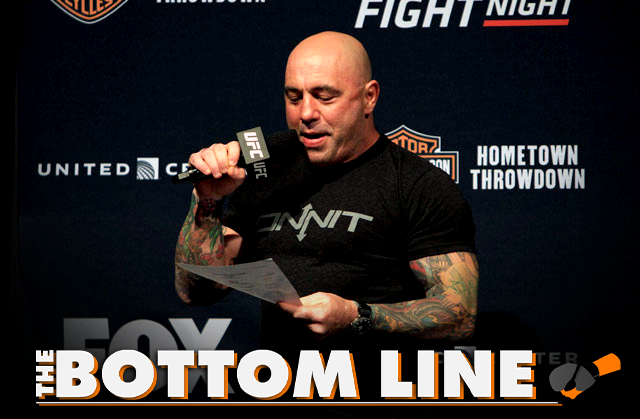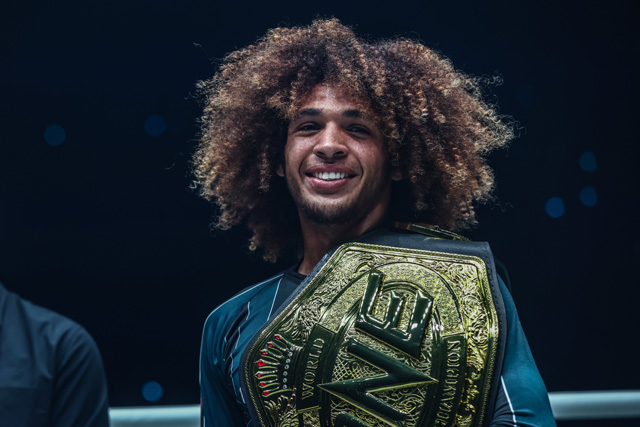The Bottom Line: Consider the Source

Editor’s note: The views and opinions expressed below are those of the author and do not necessarily reflect the views of Sherdog.com, its affiliates and sponsors or its parent company, Evolve Media.
So much for the scheduling conflict story.
Advertisement
More telling was Jon Anik referencing a text he got from Rogan during the Israel Adesanya-Robert Whittaker main event. Anik had to know this went against the public story that had been given to that point about Rogan’s absence, but more than that, it was an implicit statement of support for his longtime broadcast partner. After a week in which Rogan was pilloried and framed as a toxic figure, Anik was letting it be known he had no problem bringing him up as a friend he texts about fights and one who has insights worth sharing.
The fact that the defense of Rogan by Adesanya was notable in any
way speaks to what a tumultuous period it’s been for the analyst.
For those who are not MMA fans, it’s likely not that hard to
develop an unfavorable opinion of the former “Fear Factor” host.
There is no shortage of op-ed pieces decrying Rogan and framing his
podcast in particular as the dangerous missives of a bigoted,
anti-science loudmouth catering to a toxic fan base of angry young
white males. If you don’t listen to Rogan’s podcast—as popular as
the podcast has become, that’s still the vast majority of
people—it’s difficult to imagine not being at least a little leery
of this man they want you to know is dangerous.
For longtime MMA fans, it’s quite a different experience. Since when did Rogan grow horns? He has been an affable presence on the MMA scene for the majority of some of our lives, championing the sport enthusiastically. There are criticisms of his commentary among some MMA fans, but they usually revolve around subjects like his being excited to the point of hyperbole about a champion with a successful title defense or two or an emerging contender. Che Mills, as it turned out, was not a blend of Anderson Silva, Wolverine and Chuck Norris. Rogan might also get some ridicule about getting a little overly excited about the efficacy of the rubber guard in MMA, no doubt influenced by his longtime friend Eddie Bravo. These aren’t exactly existential concerns.
The same likely applies to his podcast for many. MMA fans who tried out “The Joe Rogan Experience” are likely to have gravitated towards his combat sports interviews, which are pretty much what you’d expect, with the occasional Georges St. Pierre UFO discussion. The quality of his other podcasts largely depends on the guest. Good guests tend to make for good podcasts because Rogan is generally a thoughtful listener who lets people speak. That also provides the rope for bad guests to demonstrate that their ideas suck, even if Rogan is polite and perhaps overly welcoming to nonsense.
The idea that talk shows should be shut down for giving a platform to opinions with which we disagree has always been a strange and unsettling one. What is a democracy if not an ongoing open exchange of ideas? It’s even stranger in the context of a talk show with Joe Rogan, who is less a fire breathing ideologue and more of a weed-smoking goof who loves to talk about MMA and conspiracy theories. For all the talk about his podcasts with Alex Jones or Jordan Peterson, his podcasts with Graham Hancock and Randall Carlson get much more to what he’s about: explorations of wild theories that he has fun talking about, whether or not they happen to be true.
This is not intended as a full-throated defense of all things Joe Rogan. The Planet of the Apes joke that was repeatedly referenced in the past week was racist, full stop. Rogan can correctly argue other things he has said were taken out of context, but that isn’t one of them. He should have acknowledged as much, even if it was important to him for people—particularly people who have never actually listened to him—to know he’s not racist.
On balance, though, the broad question being asked right now isn’t whether Rogan has said stupid things in the past. Rather, he’s viewed as dangerous by enough people that there’s a concerted effort to try to get him de-platformed. Perhaps this starts to make sense if you’re coming at it with a particular perspective and you’re looking at Rogan from a very far distance. To a deep-rooted MMA fan taking in Rogan up close for 20 years, the effort to make him into some sort of threat lands very differently. The whole thing feels silly.
« Previous By The Numbers: Johnny Walker vs. Jamahal Hill
Next UFC 271 Medical Suspensions: Derrick Lewis Gets 60 Days After Brutal Knockout »
More




 UFC News & Features
UFC News & Features


